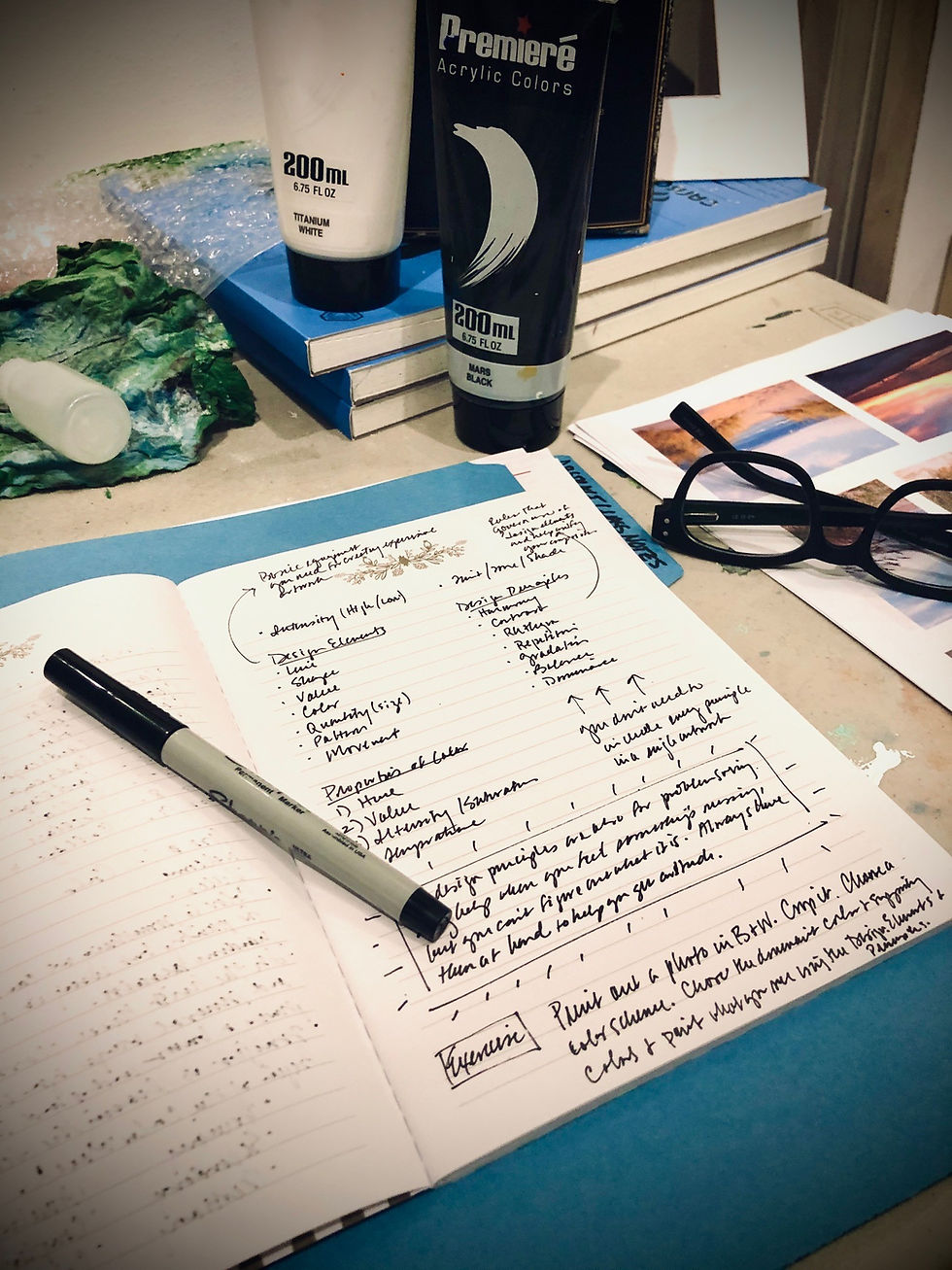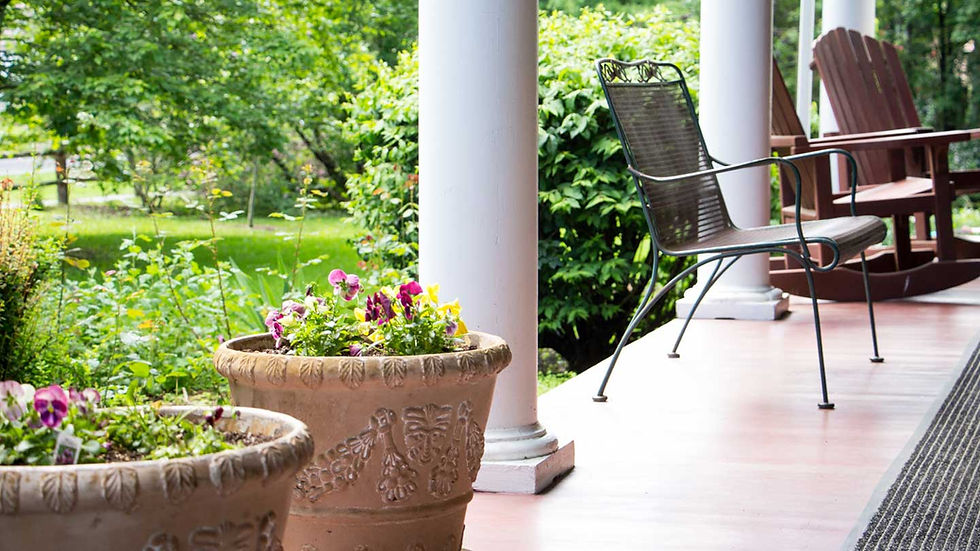The Joys of Teaching...and Learning
- Bryan Jernigan
- Feb 1, 2020
- 5 min read
The new year has started with a bang, as I've not only started a new semester of teaching at the Art League of Alexandria (VA) where I tackle abstract painting, but late last month, I completed my first pastel workshop of the year at the Vienna (VA) Arts Society, where I taught more traditional landscape scenes and dipped into still life painting.
It may seem like abstraction and representational painting would be so far apart as to be impossible to teach, but for me, the two ends of the spectrum have always been a part of my creative process.
I know many teachers and critics who say painters should choose a genre or a type of painting and explore it deeply so they can become masters of their craft. Don't, they say, sprinkle your interest in too many places or you'll end up not very good at any particular thing.
I agree, and yet disagree. At least to some extent.
I believe, when you are learning something creative, it's important to explore all kinds of pursuits. If you're a singer, how will you know you want to focus on opera or choral music, if you haven't tried either? Would musical theater suit you better? What about being the lead in a bar band? Maybe that's your style?
For artists, painters especially, I think it's important to take classes to get a taste of what you think you may want to pursue and to surprise yourself as to what you didn't know you would like. Many abstract students of mine ask me how important it is for them to know how to draw. I mean, formally sketch. I believe it's important to have a basic foundation, but then pull from it what works for your abstract style. Likewise, people inquire as to whether they should be equally adept at watercolor, acrylic, oil, cold wax and other genres. I say, if it interests you, explore it.
Exploring is really important at the beginning of your learning process and throughout your painting career. You don't have to be, you will not be, a master of any genre after taking just one class. But what you will find is what you like and what you don't. And that's a huge help when you're learning.
That's how I became a communications person. I took one algebra class in college and that guided what I chose to focus my energies on from that time until now. It was the only "C" I ever made in college and it allowed me to discover that I wanted to do any number of things that required minimal math. LOL.
At some point, though, you want to curtail the risk of becoming a perpetual student and start to hone in on the things you really love creating. That doesn't mean you should stop taking classes. To the contrary, you should continue to learn, but take classes in the areas you really want to pursue. Alternately, especially with art classes, you can take the same ones over and over.

I teach a basic abstract painting class and I always tell my students: Every painting is different and presents different challenges. Taking the same class again and again doesn't mean you're not getting it or that it's remedial. The concepts are such that sometimes you need to hear them more than once so they really sink in.
Does this mean your instructor will just duplicate the same material from semester to semester? Not if they are worth their salt!
I tell my returning students that I will tackle some of the same concepts - for instance, composition, value and color, but I try to come at them differently each semester. As a teacher, I understand that approaching a concept in a new and different way can often be the trigger to opening up a student's understanding.
It's not unusual for a returning student to come to me with something like: "You know, the way you spoke about value last semester didn't really soak in, but after today's lesson, I get it now!"
I really do spend a lot of time reading new ideas on these concepts, making notes, coming up with exercises that illustrate the points I'm making - and I love it!

Having a bit of time pressure, knowing that a new semester is about to begin, allows me to dig in and do the work myself. And in doing so, it pushes my own personal artwork and creativity to new places.
I've been teaching every single semester - including summers! - for the last five years, and before that, I taught for 10 years for a different institution. But I'm always learning new things. And when I do, it excites me to share my discoveries with others.
My counsel to anyone is that every person is innately creative...even the ones who come back with, "but I can't even draw a stick figure!" Creativity is a part of us...but it's like a muscle...it has to be exercised to first wake up, then get stronger and eventually work like a well-oiled machine.
And creativity is different for everyone...it's not just about painting. It could be about woodworking, glassblowing, singing, acting, accounting (yes, accounting!).
If you haven't been creative lately...go find a class to get you going!
You'll find my workshop schedule here.
You can find my constantly updated class schedule at the Art League of Alexandria here.
What are you waiting for?
SHAMELESS PLUG ALERT:
What could be better than painting the landscape of the Shenandoah in the fall?! Come, then, and paint with me! I'll be offering a long weekend of painting - including some plein air opportunities - September 18-21, 2020 in Lexington, Virginia. And you can't beat the price that includes all meals, lodging and instruction! But it's now time to make your decision, as a $250 deposit is due no later than March 1 to secure your spot. Have a look at the details, or download the flyer on my classes and workshop page. Space is limited and spots are filling up quickly. If you enjoy learning - even if you're a beginner - you'll love this laid-back, easy-to-understand workshop driving distance for most participants! Hope to hear from you soon!

CREATIVE CORNER:
Each semester, when my classes begin, I try to hit the importance of three things in creating great abstract paintings...
Composition
Value
Color
Composition is one of the most challenging for me, so a painter I respect shared this tip with me on how to create stronger compositions, and the great thing is you can do this with works you already have! Here's a quick video I put together to show you this simple exercise.









Thank you, Helen! I hope inspires you to make something great!
Thank you Bryan. I enjoyed watching your process and look forward to the next post.